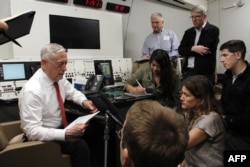An American promise to keep sailing navy ships through the South China Sea could fuel tensions between China and the United States.
China’s government has long claimed much of the sea. Observers say a military build-up there may hurt the interests of Southeast Asian countries.
Last week, U.S. Defense Secretary James Mattis said the United States will continue sending navy ships near islands in the disputed waterway.
China believes the U.S. actions are interference in Chinese waters.
China is the leading military force in the 3.5 million-square-kilometer sea. Experts say China has landed a bomber and deployed missiles to small islands under its control because of the U.S. ship movement.
Five other Asian governments claim all or parts of the South China Sea. They oppose China’s military presence in the area. Yet they also want to build trade and investment links with China.
"Currently, so far, it is a so-called new normal," Lin Chong-pin, said of the U.S. ship movement. Lin is a retired strategic studies professor in Taiwan. He added that the other governments are concerned, but they are very careful of what they say.
Continued U.S. ship movements
On May 27, U.S. Navy warships sailed near Chinese-occupied areas of the Paracel Islands, east of Vietnam.
China normally follows the movement of U.S. ships until they leave. The U.S. military calls these movements "freedom of navigation" operations.
The U.S. Navy has launched seven such operations since Donald Trump became president last year.
Eduardo Araral warns that this risks creating an environment of growing distrust between the militaries of both countries. Araral is with the public policy school at the National University of Singapore.
China is said to be developing three coral reefs in the sea's Spratly Islands to support military aircraft and weapons. That information comes from the Center for Strategic and International Studies in Washington, D.C.
China's Xinhua News Agency said last Saturday that the U.S. ship movement is an aggression against China’s sovereignty. It said the U.S. presence is the reason for China’s increased military presence in the South China Sea.
"For the Chinese, it's a matter of national pride," said Collin Koh, a security expert at Nanyang Technological University in Singapore. He added that if China does not take any action against the U.S. naval operations, it would be an insult to the Chinese Communist Party.
Brunei, Malaysia, the Philippines, Taiwan and Vietnam each claim part of the South China Sea. Their militaries are weaker than that of China, but they still have an interest in the sea's natural resources, such as oil. They are unhappy with China for sending military equipment to the small islands.
Vietnam and the Philippines have claimed some of the islands that China has developed and militarized. They sharply criticized China in the past, but now communicate one-on-one with its government and through the Association of Southeast Asian Nations. In return, China is urging people to visit Vietnam and invest development aid in the Philippines.
The U.S. government does not have a claim in the South China Sea, but sees it as an international waterway. At least one-third of the world's shipping traffic passes through the sea. Some experts believe Trump is using the ship movement to pressure China over two-way trade and its support for North Korea.
Building loyalty
The United States has suggested that its South China Sea activity can help the smaller Asian claimants to the South China Sea.
On June 2, Mattis and Vietnam’s defense minister spoke at the Shangri-la Dialogue military leadership talks in Singapore. They agreed that a strong defense relationship between their countries will support regional and international security, including in the South China Sea.
The U.S. Department of Defense website said that Mattis and the Philippines defense secretary agreed on the importance of keeping the Indo-Pacific Sea free and open.
Australia and Japan support the U.S. position of an open sea. The two countries are expected to send their own ships to the South China Sea. Japan, which has its own issues with China, is interested in defending Vietnam and the Philippines.
I’m Phil Dierking.
Ralph Jennings wrote this story for VOANews.com Phil Dierking adapted his story for Learning English. George Grow was the editor.
What do you think is the best way to keep the peace in the South China Sea? Write to us in the Comments Section or on our Facebook page.
_______________________________________________________________
Words in This Story
infrastructure - n. the basic equipment and structures (such as roads and bridges) that are needed for a country, region, or organization to function properly
navigate - v. to find the way to get to a place when you are traveling in a ship, airplane, car, etc.
pride - n. a feeling that you respect yourself and deserve to be respected by other people
reef - n. a long line of rocks or coral or a high area of sand near the surface of the water in the ocean
region - n. a part of a country, of the world, etc., that is different or separate from other parts in some way
strategic - adj. of or relating to a general plan that is created to achieve a goal in war, politics, etc., usually over a long period of time
resource - n. something that a country has and can use to increase its wealth
sovereignty - n. a country's independent authority and the right to govern itself










